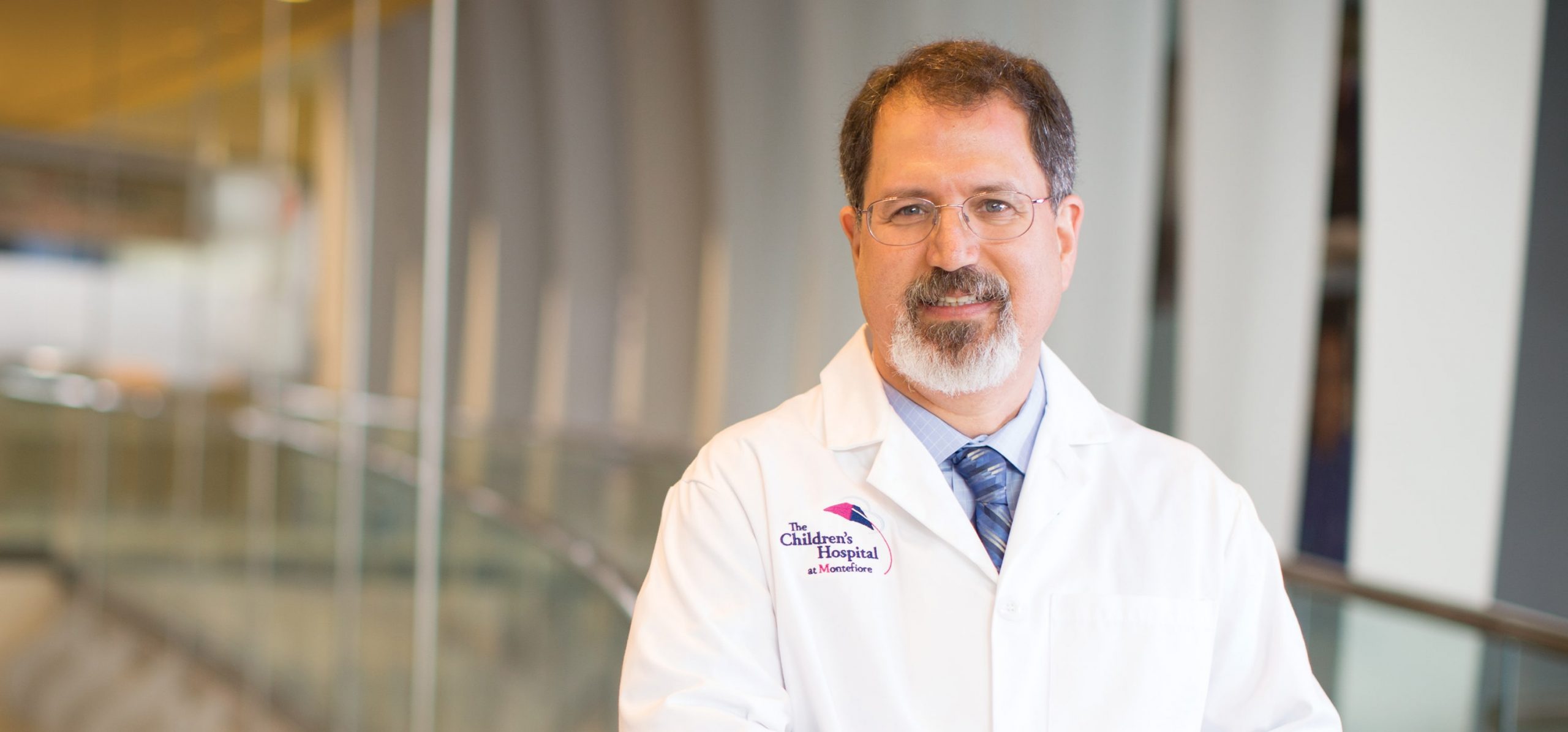
David Loeb, M.D., Ph.D., is a professor of pediatrics and of developmental and molecular biology at Einstein, the chief of hematology/oncology in the department of pediatrics and at the Children’s Hospital at Montefiore, and a member of the National Cancer Institute–designated Montefiore Einstein Comprehensive Cancer Center (MECCC). A native of Maryland, he graduated with an M.D. and a Ph.D. from Columbia University’s Medical Scientist Training Program. He came to Einstein and Montefiore in 2017 after 17 years at Johns Hopkins University.
When did you first know that you wanted to study cancer?
My summer after high school I worked in a lab at the National Institutes of Health doing cancer research. I decided that I wanted to study biology, get a Ph.D., and run my own lab. When I got to the clinical part of my M.D./Ph.D. program, I discovered that I really liked taking care of patients, so I opted to become a clinician-researcher. During my pediatrics rotation, I realized that there was a specialty called pediatric oncology.
Why have you focused on sarcomas [cancers of the bone and soft tissues]?
I was a junior researcher working on leukemia when Hopkins created a program for sarcoma, a cancer that strikes mainly children and adolescents, and I was asked to run it. I soon realized that outcomes for almost every field of pediatric oncology had improved in the previous few decades, but the survival outlook for kids with metastatic sarcomas was no better than in the 1980s. If you’re curing only 20 percent of those kids, there’s a huge opportunity to do research that will make a difference in patients’ lives.
Isn’t pediatric oncology a tough field emotionally?
I hear that all the time. There’s no better way to stop small talk at a party than to say that you treat kids with cancer for a living. But the truth is that even though they have cancer, kids are often cheerful and upbeat. The pediatric floor of the hospital is a happy place to be, and I like working with kids.
What brought you to Einstein?
I responded to the search committee on something of a whim. Then I went to dinner with several division chiefs, and it was one of the first times in my life that I felt imposter syndrome. It occurred to me that working in a place filled with so much intelligence and talent would be a good thing. Almost everybody I talked to on campus with a lab was excited about the projects we could collaborate on. I was also drawn to the social-justice mission that permeated all my conversations on both the medical and the research side.
One of your lab’s achievements was developing a new mouse model for metastatic sarcoma. Why was that needed?
Until then, most people used what’s called a tail-vein model, injecting cancer cells into a mouse’s tail and hoping that the bloodstream would carry them to a place in the body where they would start to grow—not the best model for metastasis, since a primary tumor wasn’t involved. We discovered that we could create a primary tumor by implanting tumor fragments into a mouse’s leg bone, allowing us to study how cancer cells find their way from that tumor to the lungs and other organs and to investigate therapies to prevent that from happening.
Could you talk about the connection between signaling pathways and bone cancer?
The Wnt signaling pathway normally drives precursor cells to form bone cells, but can lead to cancer when it goes awry. We showed that aberrant Wnt signaling is involved in both Ewing sarcoma and osteosarcoma—the two most common forms of bone tumors in children, adolescents, and young adults. Now we’ve identified a compound from a small pharmaceutical company that appears to stop abnormal bone-cell growth by targeting a different pathway. If the drug proves effective in mouse models, I’m optimistic that the company will support a clinical trial in kids with bone cancer.
How did you realize that an antiviral drug might work against cancer?
That’s a cool story. I was having coffee with a former postdoc colleague who mentioned that he was working with a compound originally developed as an antiviral; it inhibits the enzyme DDX3, which RNA viruses such as HIV and hepatitis C depend on. My friend had found that it killed breast cancer stem cells and suggested we try it against Ewing sarcoma stem cells. We found that DDX3 is expressed at high levels in almost all the sarcomas we looked at, and that this DDX3-inhibiting compound kills sarcoma stem cells. We later discovered that DDX3 helps repair DNA damaged by radiation, suggesting that the DDX3 inhibitor could boost the efficacy of the radiation therapy that many sarcoma patients require. In the radiation oncology world, one of the holy grails is relatively nontoxic drugs that make therapy more effective without having to increase the radiation dose. My friend has formed a company to develop the drug and we hope to test it in clinical trials next year.
What are you working on that could have a big impact in the near future?
We need a better way to identify which kids are likely to be cured by their original therapies and which ones face a high risk for relapse and require continued treatment. So my MECCC colleague Dan Weiser [M.D.] and I are looking for biomarkers of cancer spread, based on tumor DNA and cytokines [small proteins] in the bloodstream. MECCC is part of a multi-institution clinical trial collecting and analyzing blood, at predefined times throughout their treatment, from young patients with solid tumors. We’re optimistic about finding biomarkers that will help us distinguish between kids who need additional, intensive treatment and those who can entirely avoid further therapy.